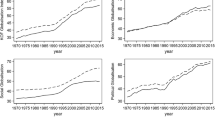Abstract
The recommendations of international organizations such as the World Bank, ILO, OECD and FAO and comparable demands by critical social scientists evince a growing awareness that basic human needs should be made the point of departure and orientation for analyses, planning and evaluation. They betoken a decisive turning away from the conventional growth- and employment-oriented economic policies towards a strategy which is determined by basic needs.
Similar content being viewed by others
References
D. Meadows et al., Die Grenzen des Wachstums. Bericht des Club of Rome zur Lage der Menschheit (The Limits to Growth. Report of the Club of Rome on the Situation of Mankind), Hamburg 1973 and A. O. Herrera et al., Grenzen des Elends. Das Bariloche Modell: So kann die Menschheit überleben (Limits to Poverty. The Bariloche Model: How Mankind Can Survive), Frankfurt 1977. A detailed bibliography of the subject dealt with in this article can be found in D. Schwefel, Grundbedürfnisse und Entwicklungspolitik (Basic Needs and Development Policy), Baden-Baden 1978; english issue: Basic Needs, Planning and Evaluation, Berlin (German Development Institute) 1979.
International Labour Office, Employment, Growth and Basic Needs, Geneva 1976.
M. ul Haq, The Crisis in Development Strategies, Paris, UNESCO 1972 (hect.).
See Bundesministerium für wirtschaftliche Zusammenarbeit (Federal Ministry for Economic Cooperation) (ed), Entwicklungspolitik im Spiegel der Presse (Review of Press Reports on Development Policy), Bonn 1976 ff.
J. Tinbergen, An Interdisciplinary Approach to the Measurement of Utility or Welfare, Dublin 1972.
R. S. McNamara, Address to the Board of Governors, Nairobi, IBRD 1973.
VWD Europa (1975), p. l, 3.
ILO op. cit. and International Bank for Reconstruction and Development, Undernutrition and Poverty, Washington, IBRD 1975 (hect.).
L. Joy et al., Food and Nutrition Planning, Rome, FAO 1975.
F. Engels, “Anti-Dühring”, Berlin 1973.
In G. Tittel, Das ökonomische Grundgesetz des Sozialismus und die Hauptaufgabe (The Economic Basic Law of Socialism and the Main Task), in: Wirtschaftswissenschaft, Vol. 21 (12), 1973, p. 1836 ff.
H.-D. Haustein, Zur Ermittlung des geselischaftlich notwendigen Bedarfs als einer wichtigen Ausgangsgröße der Planung (On the Determination of the Social Requirements as an Important Planning Parameter), in: Wirtschaftswissenschaft. Vol. 20 (6), 1972, p. 871 ff.
G. Schilling, Bedürfnisse und Bedarf als Ausgangspunkt der Planung (Needs and Requirements as the Starting Point of Planning), in: Wirtschaftswissenschaft, Vol. 21 (2), 1973, p. 161 ff.
Author information
Authors and Affiliations
Rights and permissions
About this article
Cite this article
Schwefel, D. Basic needs, planning and policies. Intereconomics 14, 132–138 (1979). https://doi.org/10.1007/BF02924554
Issue Date:
DOI: https://doi.org/10.1007/BF02924554




